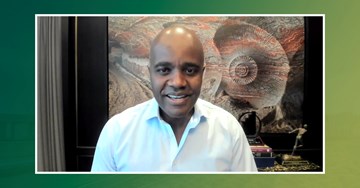One night in February 2020, Laurence Mussio was admiring the elaborate masquerade masks people wore at Venice Carnival. The next day, those decorative face coverings were replaced with personal protective equipment and Mussio fled the city as news broke that a deadly virus was sweeping through Italy. In the weeks following, much of the world began to shut down.
Mussio, a Canadian business historian and CEO of Signal Influence Executive Research & Communications (SIERC), shared his story at a LeaderShift webinar session called Corporate Leadership in an Era of Transformation. He said the tragic turn of events shows how quickly one era ends and another begins.
“One day you’re reveling at a costume ball and the next you’re converting your laundry room into a long-term home office,” he said. “For leaders and systems, the onset of crisis caused the masks of competence and invincibility to slip – sometimes very badly. It also brought forth many examples of courage and strength.”
Among other things, public policy reacted swiftly to help the economy, and vaccines were developed in record time. Mussio said this shows that governments matter and that cooperation between the public and private sectors can be a formula for success if working collaboratively for the common good. But will this lead to lasting impacts and new thinking on corporate leadership? The pandemic may have given us a once-in-a-lifetime chance to reset, but Mussio said that requires leaders to commit to transformational shifts that will make a positive difference.
“The pandemic was a short-term leadership test. Dealing with sustained change is a long-term one,” he said.
Mussio led a discussion with two senior executives who have been at the frontlines of Canada’s corporate leadership response to the pandemic: Darryl White, CEO of BMO Financial Group; and Mona Malone, CHRO and Head of People & Culture at BMO Financial Group; both HBA ’94. They shared insights on lessons learned, the changing role of the corporation, internal challenges, and the role of leadership character. Here are some takeaways.
Watch the video of the presentation (above).
What did the pandemic expose?
On the downside, the pandemic revealed many inequalities in society and White said addressing those inequalities will be a huge challenge ahead. But, White said the crisis showed how quickly we can change, when necessary, which gives him hope that this challenge can be met.
“We typically live in a world, all of us in our personal lives or in our institutional lives, where [we think] change is hard, change is difficult, people don't want to change so you have to be careful with the pace of change. And we proved that we changed instantly in that moment,” he said. “I think it tells us something about our capacity and our capabilities being probably a lot more far-reaching than we really think they are. So if we carry that thought forward – the capacity to do more than we ever thought possible and to change faster than we ever thought possible – that’s a pretty important insight.”
Malone shared three findings: the benefits of partnerships, the importance of mental health as a core business issue, and the potential to innovate to reinvent the future of work. Another key lesson was the need for good leadership in times of crisis.
“When I think about the role that leaders play at times of crisis, people really remember how they felt based on the communications, the empathy and the judgments that you make. And so I think that individual leaders at any seat in an organization really do have an enormous impact on those around you, and they don't forget it,” she said.
The changing role of corporations
Is it possible to build back better, or will we go back to our old ways? White said the pandemic brought advancements in two key areas, digitization and sustainability work, and we’ve progressed too far to let go of that momentum.
“People talk a lot about digitization having brought forward five years’ worth of advancement. I think we've brought forward five years’ worth of work – good work and plans – on climate and sustainability as well. But not just plans to have a plan. A plan with measurable outcomes that we're accountable for –that's been a big change through the pandemic,” he said.
Whether it’s climate issues, social injustice, or income inequality, there are complex social problems ahead to address. Malone said there is a need for more purpose-driven organizations and good leadership to bring that to life.
“It’s really thinking about how your organization can make an impact in society to make things better for the biggest problems and for all stakeholders – that is one deep insight. And then recognizing that the actions the organization takes – the actions in terms of where they invest and the actions of the individual leaders – are what brings this to life,” she said. “This concept of purpose to me is really important.”
Internal challenges
How leaders make decisions is as important as the actual decisions. Malone said a few key principles are at the forefront of good decision-making:
- Are you learning from the experiences that you go through individually and collectively as an organization?;
- Are you making sure you get inputs from multiple places – not just data and insights, but the judgment of people around you?; and,
- Are the people providing input diverse and have you created conditions where they feel they can speak out?
“It's not just a command-and-control environment. You [need to] really care about the level of engagement and the intellectual horsepower the [people around you] bring in terms of their judgments and their perspectives,” she said. “Do you listen and consider them when you're making your final determinations? And is that happening at multiple levels across your organization?”
Ensuring you have all the right voices at the table is equally important. White said leaders need to make sure they aren’t forgetting about those individuals who can provide fresh and objective perspectives.
“That diversity has to take on a lot more complexity and a lot more layers than you might think on the surface in order to get the right input,” he said.
The importance of leadership character
The issues leaders face today are more complex than they were decades ago. And while traditional leadership dimensions, such as drive and accountability, remain important, Malone said leadership character means you’re also taking into consideration humility, humanity, and empathy.
“When you think about the fact that you're dealing with the most complex problems … with people … this concept of understanding character as part of it and for companies to think about their leadership frameworks, including the concept of character, I think is really important,” she said. “To be a purpose-driven organization means the actions of individuals can have an enormous effect on the company as a whole … Creating a sense of what really matters to be a leader in the place is really important. Having a character-based leadership framework is one way that I think you can really powerfully do that.”
White said the crisis was a test of character and it will continue to be an important area of development for leaders to tackle the challenges of the post-pandemic world.
“A lot of people like to say character is developed in a crisis. I think that’s dead wrong. I think character is revealed in a crisis,” he said. “I think you build character through your life experiences and through what you believe in … and then crisis comes along and character is revealed.”


